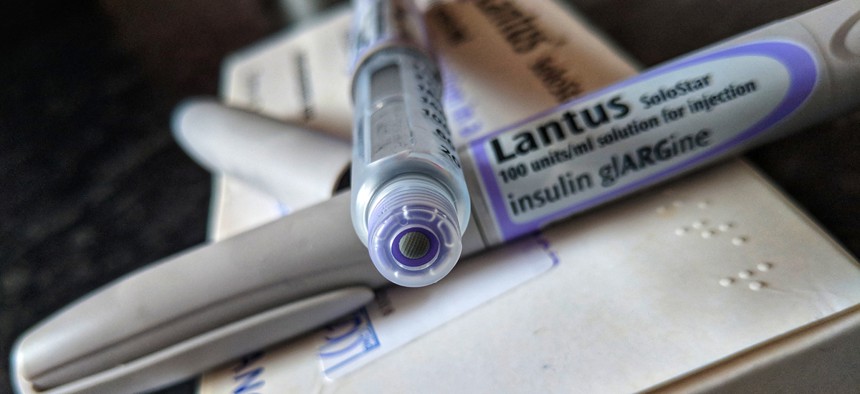Millions of Americans Rely on Crowdfunding for Medical Expenses

Crowdfunding campaigns for insulin have been popular in recent years as the drug has become more expensive. Shutterstock
A new survey estimates that 20% of adults in the U.S. have donated to a crowdfunded medical campaign.
An estimated 50 million Americans—or 20% of all adults in the country—have donated to a crowdfunding campaign to help cover somebody’s medical expenses, according to a survey from the National Opinion Research Center at the University of Chicago.
The survey of 1,020 people revealed that 46% had donated to a friend’s campaign and 35% had donated to a stranger’s. Researchers estimated that 8 million people have started a crowdfunding campaign for their own medical expenses, while 12 million have started one for a friend or family member.
Websites like JustGiving, Fundly, and GoFundMe have risen to prominence in recent years as Americans struggle to pay for rising healthcare costs. Medical fundraisers have become so popular on GoFundMe—over 250,000 medical campaigns are run each year—that the website now publishes guides on how to fundraise for insulin or gender confirmation surgery.
The survey has prompted renewed calls for Medicare for All this week. Presidential candidate and U.S. Sen. Bernie Sanders reiterated his support for the policy on Twitter. “Enough is enough,” he tweeted. “No one should have to beg for money to get the health care they need in the richest country on Earth.”
Stephanie Nakajima, director of communications for Healthcare-NOW, an organization advocating for a national single-payer healthcare system said that the survey “illustrates the extent of the problem” with healthcare costs in the United States. “Even with private insurance, people still face an incredible cost burden to access healthcare,” Nakajima said. “Our conversation needs to be about more than getting [the small percentage of people who are uninsured] covered but about making the system more equitable for everybody. Only Medicare for All will be able to do that.”
The U.S. adult uninsured rate reached 13.7% in the fourth quarter of 2018. The percentage of uninsured children rose to 5.5% in 2018. The increase in children without insurance coverage is largely blamed on a drop in the number of kids covered by Medicaid and the Children’s Health Insurance Program run by states.
Even people with insurance can still face enormous costs and high deductibles, said Mollie Hertel, a senior research scientist at NORC. “As annual out-of-pocket costs continue to rise, more Americans are struggling to pay their medical bills, and millions are turning to their social networks and crowdfunding sites to fund medical treatments and pay medical bills,” Hertel said in a statement. “Although about a quarter of Americans report having sponsored or donated to a campaign, this share is likely to increase in the face of rising premiums and out-of-pocket costs.”
A representative from GoFundMe told Route Fifty that medical expenses are the top fundraising category globally, including in places with more government involved in health care like Canada and Australia. People are most often asking for money to help with bills, lost wages for the patient or caregiver and travel to treatment.
"Every day on GoFundMe, we see the challenges Americans face with the rising costs of a broken health care system. Their stories are often heartbreaking, and we strive to be a place where people in need can find help and support,” reads a statement from the company sent to Route Fifty via email. “However, while GoFundMe can provide timely, critical help to people facing health care crisis, we do not aim to be a substitute social safety net … We believe that affordable access to comprehensive health care is a right, and action must be taken at the local, state, and federal levels of government to make this a reality for all Americans.”
A 2017 study found that 90% of medical campaigns on GoFundMe did not meet their fundraising goal, with the vast majority only hitting 40% of their target. That study found that 54% of campaigns were launched in states that had opted out of expanding Medicaid.
Successful crowdfunding, the authors wrote, requires social media savviness, an aspect of fundraising that they cautioned would "deepen social and health inequities in the U.S. by promoting forms of individualized charity that rely on unequally-distributed literacies to demonstrate deservingness and worth."
Last year, GoFundMe CEO Rob Solomon told Kaiser Health News that he’d like to see change. "We didn’t build the platform to focus on medical expenses,” he said. “I would love nothing more than for 'medical' to not be a category on GoFundMe.”
Emma Coleman is the assistant editor for Route Fifty.
NEXT STORY: In Tornado Alley, Storms Are Even More Dangerous For People With Disabilities






